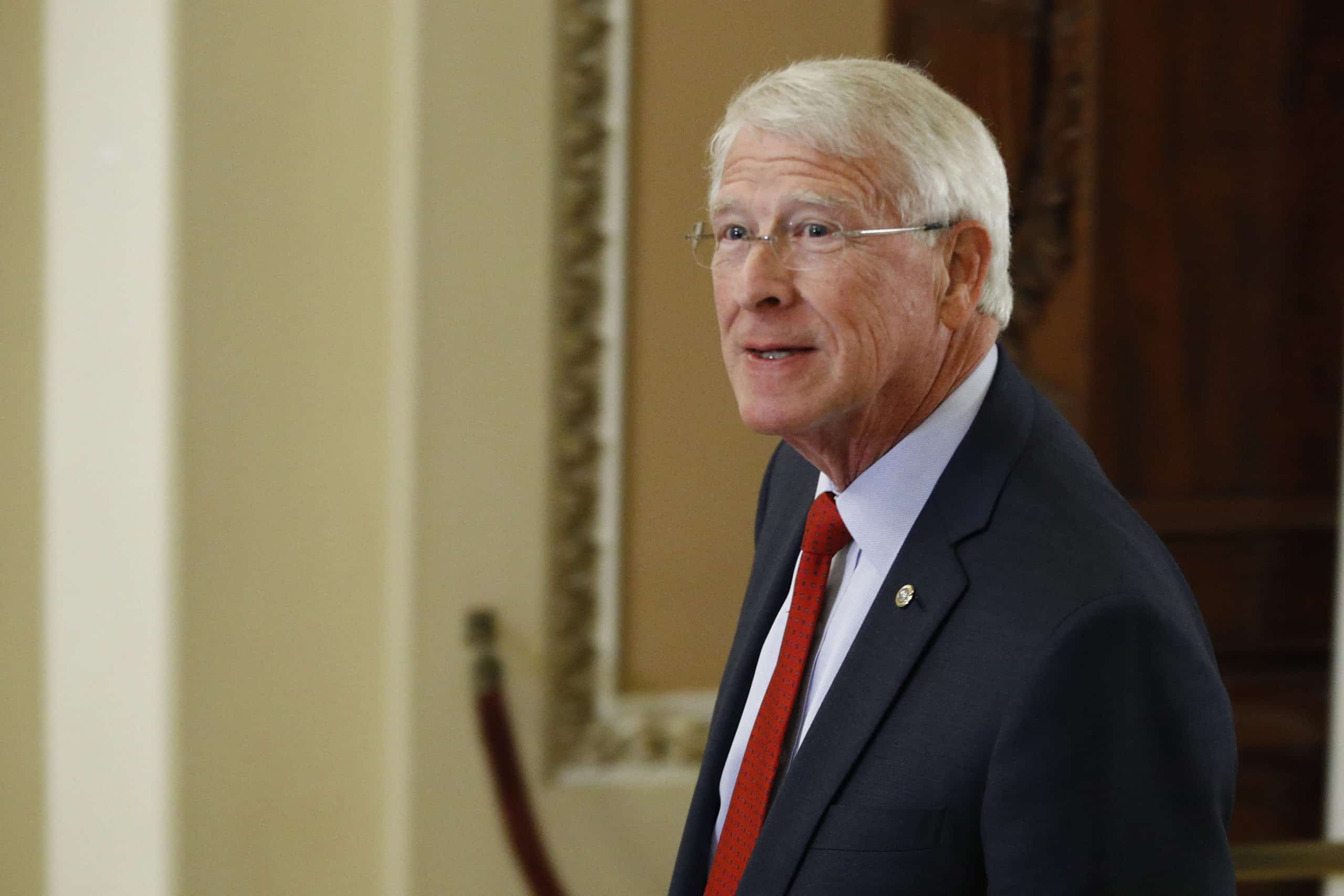Mississippi Today
Senate confirms U.S. attorney Todd Gee, who will inherit historic Mississippi welfare probe

WASHINGTON — The U.S. Senate on Friday voted to confirm the appointment of Todd Gee to run the U.S. Attorneys Office for the Southern District of Mississippi, which is overseeing what officials have called the largest public fraud case in state history.
At a time when appointments to the U.S. Department of Justice have been particularly politicized amid the prosecution of former President Donald Trump, Gee’s confirmation was pushed through with help from Mississippi’s senior U.S. Sen. Roger Wicker.
The Senate confirmation comes more than a year after President Joe Biden appointed Gee to the post.
“I talked to my colleague and friend Roger Wicker about Mr. Gee,” said Sen. J.D. Vance, a Republican from Ohio who previously worked to block any appointments to the nation’s lead law enforcement agency. “He assured me he’s a good person. We don’t have any major red flags in the background, so we ultimately voted yes. But the problem is, with all these nominations, is their boss. It’s not them, it’s their boss, who is (U.S. Attorney General) Merrick Garland.”
READ MORE: Who is Todd Gee, who will take over federal welfare scandal investigation?
Historically, unless there was some question of a nominee’s fitness, the Senate would approve the president’s picks en masse by a voice vote, but some Republican senators like Vance have insisted on confirming Gee and others through a roll call vote.
“The president is entitled to his or her nominees,” said University of Richmond Law Professor Carl Tobias. “This cuts against a long standing tradition.”
Wicker, Mississippi’s senior senator, could be seen on the Senate floor throughout the duration of Gee’s confirmation vote on Friday at times conversing with other senators.
President Joe Biden nominated Gee, who had been serving as deputy chief of the Public Integrity Section of the U.S. Department of Justice, a little over a year ago. Gee’s appointment had stalled until U.S. Sen. Cindy Hyde Smith returned a “blue slip” — an informal congressional practice that signaled her support for the nominee — in April. It took another five months for the U.S. Senate Judiciary Committee to agree to bring the nomination of Gee to a vote.
“It’s unfortunate that Mississippi had to wait a year for that,” Tobias said. “It just doesn’t make any sense at all, especially when it’s not on the merits of the nominee. It just shows you the dysfunction of the Senate.”
Senators voted 82-8 on Friday to approve Gee. Opposing his nomination were Republican U.S. Sens. Ted Cruz (R-Texas), Rick Scott (R-Florida), Rand Paul (R-Kentucky), Josh Hawley (R-Arkansas), Mike Braun (R-Indiana), Katie Britt (R-Alabama), Ron Johnson (R-Wisconsin) and Eric Schmitt (R-Missouri).
Mississippi’s southern district, which encompasses the capital city Jackson, has not had a permanent U.S. attorney at its helm since Mike Hurst stepped down in January of 2021. Interim U.S. Attorney Darren LaMarca has led the office since.
Gee will take the lead on prosecuting Mississippi’s historic welfare fraud case, in which several people have already admitted to using millions of federal grant funds that should have assisted Mississippi’s most vulnerable families instead to make favors for political allies or enrich their friends and family. Seven people, including former Mississippi Department of Human Services Director John Davis and prominent nonprofit founder Nancy New, have pleaded guilty to state or federal charges within the scheme, but none of them have been sentenced as they continue to cooperate with investigators.
The last public action the U.S. Attorneys Office has taken in the case was indicting former WWE wrestler Ted “Teddy” DiBiase Jr. in April. DiBiase pleaded not guilty.
Hinds County District Attorney Jody Owens, who secured the first indictments in the case, said last year at Davis’ plea hearing that his office was continuing to review evidence, such as text messages and other communication, as it “continue(s) to move up … the ladder” to prosecute more individuals. But since then, no one in a position above Davis has been charged.
Tobias said the U.S. Attorneys Office might have decided to wait to bring more charges, especially if it is looking at higher profile individuals, until the office had a permanent leader.
“I think it gives the public and lawyers and everyone a higher comfort level when it’s not just an acting attorney but rather someone who’s been nominated by the president, confirmed by the senate and that person checks out in terms of qualifications,” Tobias said. “That’s important. Especially if it’s high profile, because that person is going to have to do some very difficult things, maybe, if it involves these high ranking political officials. So you want the full weight of the office there.”
State Auditor Shad White, who made the initial arrests in the case in early 2020, said in a statement Friday morning that his office will continue to assist Gee’s office in the case.
“More than three years ago, my team and District Attorney Jody Owens put a stop to the welfare scheme in Mississippi with the indictment and arrest of six people,” White said. “We also turned all our evidence over to federal authorities to show the public that the case would be fully investigated, all the way. At that time three years ago, federal investigators and the U.S. Attorney asked to take the lead on prosecuting any additional people beyond the first six defendants. My office agreed to assist them in any way possible. We have enjoyed a good relationship with federal prosecutors since then as they have deliberated about whom to charge. They make that call. And the appointment of Mr. Gee changes nothing in our posture. We will continue to work with federal prosecutors to bring the case to a conclusion.”
Mississippi Today reporter Anna Wolfe reported this story from Jackson. Freelance reporter Matt Laslo reported this story from Washington. Mississippi Today’s Taylor Vance contributed to this report.
This article first appeared on Mississippi Today and is republished here under a Creative Commons license.
Mississippi Today
As legislators end session without state budget, former fiscal officer explains how process supposed to work
Editor’s note: Former state Rep. Cecil Brown, who was involved in the budget process as a member of the Legislative Budget Committee from 2004 until 2012 and earlier as the state fiscal officer, explains how the state budget process works. Brown also references that the Legislature ended the 2025 session without a budget, which is not how the process is supposed to work.
This is an attempt to shine light on the Mississippi state budget process and make it understandable. Unfortunately, as we recently learned, when politics get involved, things don’t go as planned.
The state budget is the document created by the state Legislature that tells government officials how much money is available to spend for the upcoming fiscal year and how it should be spent. State law requires a balanced budget. Operating expenses cannot exceed available revenues. The current total annual state budget is about $28 billion, consisting of $13 billion in federal funds, $7 billion in general funds $700 million in “state support special funds” and $7.8 billion in “other special funds.”
The “general fund,” is the pot of money collected by the state from sales taxes, income taxes, use taxes and various other taxes and fees. “Special funds” are for the most part dedicated to specific uses. For example, fuel taxes are used primarily on highways.
All federal funds and many special funds have dedicated uses and are not available for general purposes. General funds, state support special funds and some other special funds can be used for the general needs of government. They are spent on K-12 education, universities and community colleges, the state’s portion of Medicaid costs and all the other legitimate obligations of state government.
The state’s fiscal year begins July 1 and ends on June 30 of the succeeding year. For example, we are currently in the 2025 fiscal year that began on July 1, 2024, and will end on June 30, 2025. Each state budget is for one year only and is adopted by the state Legislature in the legislative session that precedes the beginning of the fiscal year.
The budget process begins in the summer before the following legislative session. Staff work is performed by the Legislative Budget Office (LBO), a group of professionals who work for the Legislature. Each state agency submits a detailed budget request outlining their anticipated financial needs for the following year and number of personnel they need to carry out their missions. Requested increases require explanation and larger items such as equipment require detail analysis. The starting point for every agency budget is the money and personnel they have for the current year. Detailed analysis will be provided for new programs that require additional funding. Reductions such as non-recurring needs for new equipment also are considered.
All the agency budget requests then go to the Joint Legislative Budget Committee (JLBC) to be considered for the “budget recommendation” provided to the Legislature to consider in the upcoming legislative session. The JLBC is composed of six members of the House and six members of the Senate. In addition, the committee also includes the speaker of the House and the lieutenant governor who alternate yearly as the chair of the panel.
While LBO is working on the spending side of the budget, another group of professionals is working on the revenue side. This “revenue estimating committee” is a group of experts who look at current tax collections and other state revenues, economic forecasts and changes to estimate how much money will be available for the general fund for the following year. After all the analysis is done, the JLBC will put all the numbers together to present a complete budget recommendation to the House and Senate during the first week of the legislative session. At that time, the budget is reduced to a series of revenue and expenditure (appropriation) bills. To become part of the budget, each bill must be passed by the House and Senate and approved by the governor.
The JLBC and the governor will meet with the revenue estimating committee to adopt a revenue estimate. That estimate sets a limit on how much the Legislature can appropriate during the session. Major changes in economic outlook might require changes in the estimate and the amounts available to spend.
During the session, everything works on a time schedule – when bills must be introduced, when they must be passed by the various committees and by the House and Senate. Failure to meet a deadline can kill a bill. One-half of the appropriations bills that are part of the budget will start in the House and one-half in the Senate. Legislators often introduce appropriations bills that are outside the budge recommendation. Most of those are never considered by the committees.
Appropriation bills can be amended in the committee, passed or killed by vote. Occasionally a bill will be amended, but most pass as introduced. After that, the full house of origin will vote on the bill, and if the bill passes it will go to the other house for consideration. If the two houses cannot agree on an appropriation or revenue bill, the bill will be referred to a conference committee where three members from each body will try to resolve the differences. Most of the appropriations bills go to conference. For a bill to be finally passed, it must pass both houses in the exact same form. After passage, the bill will go to the governor who can sign it into law, veto it or let it become law without his signature. A veto can be overridden by a 2/3 vote of each house.
This year, because of internal legislative politics, the Legislature adjourned without passing a budget. The only solution is a special legislative session. If appropriations bills are not passed by June 30, state government will shut down. Nobody, including employees, can get paid. Only the governor can call a special session, and he will set the agenda. Typically, the governor will not call a session until the legislative leaders assure him they have reached an agreement.
In the end, a state budget will be adopted. Not everyone will be satisfied, but that is the nature of the democratic process.
This article first appeared on Mississippi Today and is republished here under a Creative Commons Attribution-NoDerivatives 4.0 International License.
Mississippi Today
Transfer portal, NIL have stolen the madness from March
College basketball’s Cinderella has died, and with her, so much of the NCAA Tournament’s magic has been laid to rest. Both were victims of the out-of-control transfer portal and the almighty NIL dollar.
Another way of putting it: March Madness isn’t so mad any more.
You may like that. I do not. For me, the beauty and allure of the tournament always has been when the unthinkable happens, like two years ago when 16-seed Fairleigh Dickinson shocked No. 1 seed Purdue. There was often drama, if not magic, when the monumental upset almost happened but did not, such as in 1986 when Lafayette Stribling’s Mississippi Valley State team led for most of the game before narrowly losing to overall No. 1 seed Duke.
The 2025 NCAA Tournament, one of the most predictable on record, ended Monday night with an exciting, remarkably well-played game. Florida defeated Houston 65-63. It seems appropriate that one of the Gators’ heroes was 23-year-old Mississippian, Alijah Martin, a graduate student from Summit in Pike County, who transferred to Florida after playing four seasons at Florida Atlantic. Mid-major transfers played critical roles for power programs throughout the tournament.
This Final Four consisted of all No. 1 seeds. Two No. 12 seeds won a first-round game, but there were no real stunners where a team seeded 13 or above advanced. Arkansas, a 10-seed from the SEC, was the only double-digit seed to make the Sweet 16. All the other 15 were 6-seeds or higher.
There were no stunners. No school named Oakland beat a blue blood like Kentucky. No UMBC (University of Maryland, Baltimore County) upset Virginia. No Bucknell beat Kansas. Those ships have sailed away, perhaps forever.
This year’s biggest upset came when McNeese State defeated Clemson. And that one gets an asterisk because McNeese State reportedly out-spent many power conference schools with NIL money in the transfer portal.
“Follow the money,” longtime college and NBA coach Tim Floyd, a Hattiesburg native, says. “In college basketball today, recruiting is basically buying. For the most part, low- and mid-majors simply can’t compete financially with the power conference teams.”
Belmont University of Nashville was one of those low-to-mid major schools that might have pulled a gigantic upset in this year’s NCAA Tournament. The makings of an NCAA Sweet 16 team were there from last year’s 22-12 team. But then, power forward Malik Dia transferred to Ole Miss, point guard Jacobi Miller transferred to Maryland and small forward Cade Tyson transferred to North Carolina. Strike one, strike two and strike three: Belmont was out. Ole Miss, Maryland and North Carolina all made the NCAA Tournament; Belmont, which still somehow managed to win 22 games, did not.
Belmont was not alone. Across the land, richer teams from the power conferences cherry-picked from low-and-mid major teams, buying their best players with higher NIL packages. Stetson, a mid-major powerhouse in 2023-24, lost all five starters and all top reserves through the transfer portal. A team that won 22 games a season ago won only eight this past season.
Florida Atlantic shocked everyone by going to the Final Four in 2023, then made the NCAA Tournament again in 2024. The Owls won 60 games over those two seasons. Then, Coach Dusty May left for Michigan and nine — count ’em, nine — players, including Martin, left via the transfer portal. Cinderella no more, FAU was essentially a .500 team this past season.
Mississippian Kermit Davis has been on both sides of the NCAA power divide. He coached at Middle Tennessee State for 16 seasons before a five-year run at Ole Miss. In 2016, his Middle Tennessee team, a 15-seed out of Conference USA, shocked Tom Izzo and Michigan State 90-81 in one of the biggest upsets in college basketball history.
Davis doesn’t know if the same feat would be possible today.

“I am not sure we could have afforded to hold that team together in today’s college basketball climate,” Davis said. “I know we couldn’t have held them together for that next season.”
What a lot of people might have forgotten is that Davis’s Blue Raiders won 31 games and beat another Big Ten team, Minnesota, in the 2017 NCAA Tournament.
“Today, all those players would have left Middle and have been playing for Alabama, Kentucky, Tennessee or somebody like that,” Davis says. “And you couldn’t blame them. There’s so much money out there. I’m not sure it’s good for college basketball overall, but it’s just the way it is.”
Floyd, who coached at Idaho and New Orleans before jobs at Iowa State and Southern Cal later in his career, strongly believes the new trend isn’t good for the NCAA Tournament or for college athletics in general.
“It used to be that if you had a couple holes in your roster, you would go the junior college route for immediate help,” Floyd said. “Now, you just pluck then away from smaller four-year schools and leave them high and dry. It’s professional basketball without salary caps or contracts. It’s crazy as hell.”
And, at least for this one observer, it has stolen much of the madness from March.
This article first appeared on Mississippi Today and is republished here under a Creative Commons Attribution-NoDerivatives 4.0 International License.![]()
Mississippi Today
On this day in 1918, Harlem Hellfighters joned France in WWI
April 8, 1918

The 369th Infantry Regiment, which the Germans called the “Harlem Hellfighters,” joined the French Army in battling German forces.
“The Hellfighters, the most celebrated African-American regiment in World War I, confronted racism, even as they trained for war, helped bring jazz to France, then battled Germany longer than almost any other American doughboys,” Smithsonian Magazine wrote.
They became the first Black regiment to fight in World War I. By the end of the war, 171 of the soldiers had received the Legion of Honor for their bravery. Two soldiers, Henry Johnson and Needham Roberts, received the Croix de Guerre, bestowed by France and Belgium for heroism. The soldiers also received two Medals of Honor and many Distinguished Service Crosses.
At the end of the war, they were welcomed back home with a parade along New York City’s 5th Avenue. Black Americans packed the sidewalks, and many children were dismissed from school to watch. The day of the parade, Feb. 17, 1919, became an unofficial holiday each year in Harlem. Descending units of the Regiment have continued to serve in the years following World War I.
In 2014, a graphic novel by Max Brooks and Caanan White recognized their heroic deeds, and a year later, the soldier who symbolized their fight, Henry Johnson, received a posthumous Medal of Honor.
Johnson suffered 21 combat injuries. When he returned home from his war, he was unable to return to his pre-war porter position because of the severity of those injuries and died in July 1929.
“America can’t change what happened to Henry Johnson,” President Barack Obama said in presenting the Medal of Honor, “but we can do our best to make it right.”
This article first appeared on Mississippi Today and is republished here under a Creative Commons Attribution-NoDerivatives 4.0 International License.![]()
-

 Mississippi Today7 days ago
Mississippi Today7 days agoPharmacy benefit manager reform likely dead
-

 News from the South - Florida News Feed7 days ago
News from the South - Florida News Feed7 days agoFlorida special election results: GOP keeps 2 U.S. House seats in Florida
-

 News from the South - South Carolina News Feed5 days ago
News from the South - South Carolina News Feed5 days agoSouth Carolina clinic loses funding due to federal changes to DEI mandates
-

 News from the South - Kentucky News Feed6 days ago
News from the South - Kentucky News Feed6 days ago3 killed in fiery Lexington crash temporarily shuts down portion of New Circle Road
-

 Mississippi Today6 days ago
Mississippi Today6 days agoRole reversal: Horhn celebrates commanding primary while his expected runoff challenger Mayor Lumumba’s party sours
-

 News from the South - Alabama News Feed7 days ago
News from the South - Alabama News Feed7 days agoWill Alabama Lawmakers Cut Taxes on Overtime Pay or Groceries? | April 1, 2025 | News 19 at 6 p.m.
-

 News from the South - Georgia News Feed7 days ago
News from the South - Georgia News Feed7 days agoMassive CDC layoffs begin in Atlanta | FOX 5 News
-

 News from the South - Alabama News Feed6 days ago
News from the South - Alabama News Feed6 days agoMobile defendants sentenced to life in prison for murder-for-hire conspiracy
















































